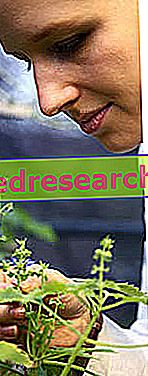The herbalist is the one who works in the fields of cultivation, harvesting, stabilization, conservation, quality control and trade of vegetable drugs, up to the formulation of the products that contain them (food supplements, cosmetics, phytotherapy, liqueurs, etc.).

Not necessarily those who work in herbal medicine are effectively herbalists . Anyone, in fact, can open one of them regardless of the educational qualifications in his possession; it is in fact sufficient to attend the special courses set up by the Chamber of Commerce of your area. Moreover, since the medicinal plants are assimilated to food supplements, then to traditional foods, anyone can market them. The preparation and sale of herbal blends from single plant drugs is the exclusive responsibility of the herbalist with a degree or diploma (as well as the pharmacist); any person can therefore sell a pre-packaged herbal tea, but only the herbalist has the right to prepare it in his workshop by mixing the most suitable ingredients for his taste or particular health needs. The herbalist, even if graduated, cannot however sell herbal products that are considered to all effects of the medicines.
The various phytotherapy courses promoted by private institutions, while increasing the cultural background of those who market these products, do not in any way qualify for the full exercise of the profession of herbalist, reserved only for graduates or ex-graduates (see below).
Obviously, it would be appropriate for anyone working in an herbalist shop to have an adequate professional qualification. In fact, natural is not always synonymous with health; medicinal plants, even those commonly found in herbal medicine, may for example be contraindicated in particular physiological conditions (pregnancy, breastfeeding, young age, etc.) or pathological conditions; not to mention the possible interactions with drugs taken at the same time. To successfully practice the profession of herbalist, we therefore need extensive knowledge of botany, human physiology, pharmacology, pharmacognosy, pathology and in many other areas of science. The same goes for dispensing advice online.
Today, to become a full herbalist it is necessary to attend and pass one of the many three-year degree courses activated at many Italian universities. In the past, however, it was sufficient to attain the diploma of herbalist after having attended the homonymous course of studies, no longer established for twenty years now. This course had a duration not exceeding one month, therefore absolutely insufficient to prepare an herbalist expert in modern herbal medicine.



